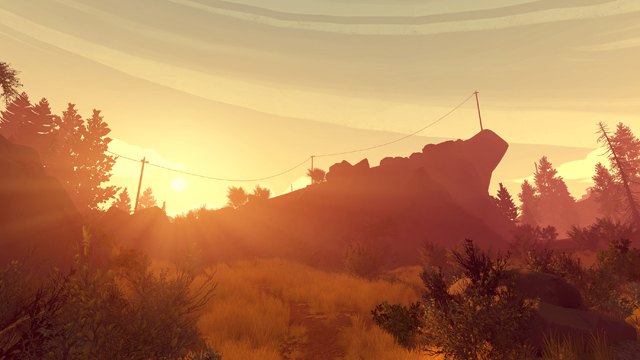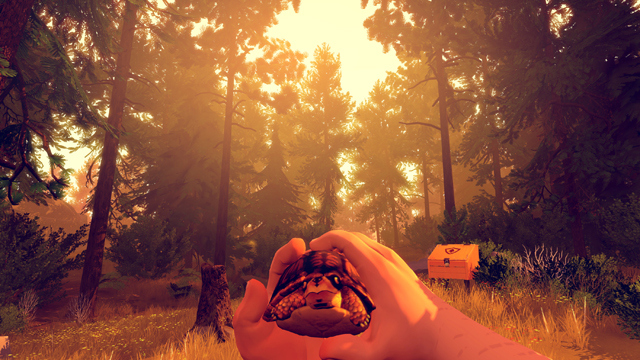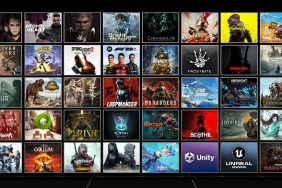A dis-empowering fantasy.
The opening of Firewatch is a bit like a visual novel—thin, elegant text displays, telling you your life story and occasionally asking you how you’d like it to go. Via a series of decisions, you work your way into the 3D world of Shoshone National Forest, breaking free from pages of text into sun-dappled woods and cool, rushing streams. This is your home for the summer, and your one job is to look for and report fire. Oddly, the compelling adventure that awaits you is one built on inaction and helplessness.
As soon as you, playing Henry, arrive at your lookout tower, your off-site supervisor, Delilah, chirps in on your walkie-talkie. She is your only gateway to humanity while you slack off in the forest, as you reconcile many of your inner demons. While you take the role of a downtrodden man, coy and full of regrets about all the things you didn’t do, Delilah is sarcastic, abrasive, and curious. One of the first questions she asks Henry is “What is wrong with you?”
In this and many situations, you have a limited time to answer, and even if you choose to do so, there is usually an answer which dodges the question entirely. Playing as much as myself as I could possibly do, I found this dynamic created one of the sincerest relationships I’ve experienced in video games. In contrast to a BioWare RPG, for example, where I’m inclined to talk to a slew of characters and build loyalties or romances, I had one strong friendship to bolster or repudiate. And the options for doing so did not fall squarely into nonsense buckets of good and bad, compatible or incompatible. Sometimes, they were shades of ashamed and rebellious. Yet I never felt funneled into saying or revealing something I would not otherwise do in real life, a potential point of frustration. This was an honest trust exercise, not an internet quiz.
Of course, while you’re busy bonding over a radio, there is a forest to explore, and a gorgeous one at that. As you shuffle between various goals, chasing down rowdy teens or grabbing supplies, you are given all the time in the world to just bask in your surroundings. As the sun rises and sets, you’re treated to a vastly changing environment of color and natural landscapes. The shapes and shadows created by the lighting often reminded me of Sunset, excelling at establishing a world of escape. As you come across strange sites and various curiosities, you’re given the ability to talk about them with Delilah. Again, it is a choice you make, though I feel as if missing any shred of dialogue with her is practically treason.
As in a number of games, Henry is not able to traverse the entirety of his environment from the start. On his first day, he acquires a rope that frighteningly snaps as he uses it to rappel down a sharp incline. Until he finds a new one, all other rappelling points are off-limits. The platforming here reminded me of Far Cry 3, where you’ll recognize uniformly coded markers telling you what you can surmount and how, and finding the tool that “unlocks” these points, marked by Henry on the map, tempts you to run around finding what you missed.
It was somewhat jarring for me to be in this narrative-focused adventure that shares gameplay elements from Metroidvanias. While I’m entranced and getting lost in a new, mysterious land, engaging an even more mysterious entity on the other end of a radio, Firewatch reminds me that I’m in a game with its own ability upgrade system. It is not that the system doesn’t work as intended—I mean, you have to travel around the forest—but the repeated assets of climbable rock faces, rappelling posts, and pathway-blocking thorny branches act as foils to otherwise lush environments with wandering trails. It is the machine laid bare before you.
To its credit, Firewatch is just exploring and talking, and this boiled-down approach worked its wonders on me. It also plays into one of the more fascinating aspects of this game juxtaposed against so many others. You play a lone, able-bodied white man as you do in hundreds of games, but Henry is sensitive instead of cynical, scared instead of brave, and powerless against both his emotional and physical turmoil. He’s not tasked with fighting fire, just reporting and avoiding it. The axe he finds is just used to clear pathways, not cut enemies down.
Without spoiling anything, it’s this concept of being powerless that enhances everything going for the story. As I said, this tale is one of inaction. Henry laments the things he did not do, and as the mystery unfolds in the forest, the one he hoped to utilize as an escape from his problems, he assumes the emotional burden of being unable to directly affect his circumstances. Things happen to and around him without his input, and the axe he carries cannot do much but help him run away, deeper into both the physical and mental forest. This idea of being a participant in a narrative that treats you both as imperative and inconsequential just really struck a chord with me. I want to return very soon.
And of course, the phenomenal performances of both Rich Sommer and Cissy Jones contribute the lion’s share of this personal resonance. They brilliantly demonstrate emotional nuance and sensitivity, and now I selfishly want them to voice all the things together. By the ending, my heart felt so heavy not just because of the events that unfolded, but because I believed in the myth of Henry and Delilah I created over a tumultuous summer in Shoshone. Although I loved the exploration, I felt the loneliness when no voice was on the other end, wanting to joke with or occasionally comfort me.
You should get lost in the woods, too.
-
Beautiful natural environments
-
Phenomenal voice work
-
Compelling tale centered on inaction and helplessness
-
Metroidvania feel to exploration is jarring
Firewatch
-
Firewatch #1
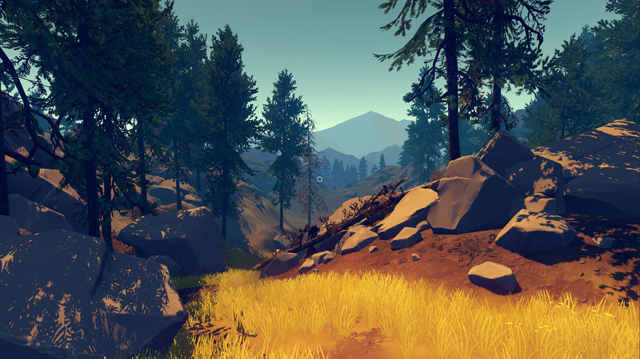
-
Firewatch #2

-
Firewatch #3
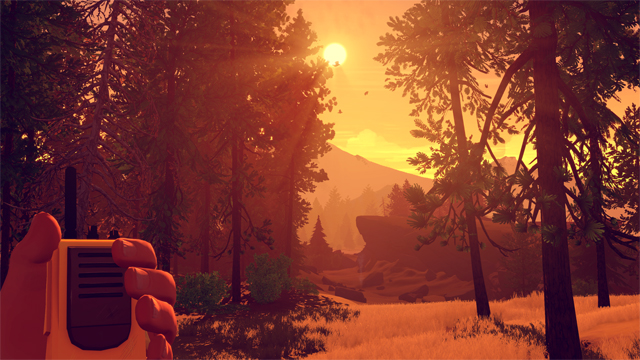
-
Firewatch #4
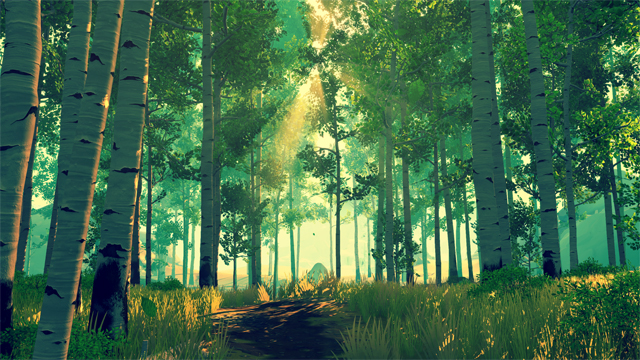
-
Firewatch #5
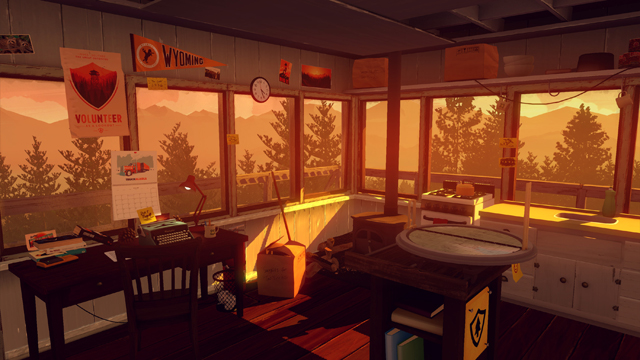
-
Firewatch #6

-
Firewatch #7
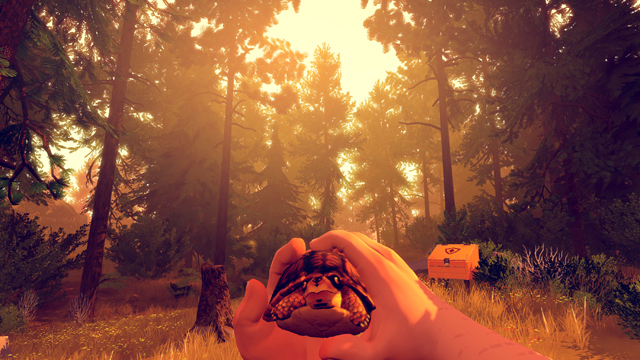
-
Firewatch #8
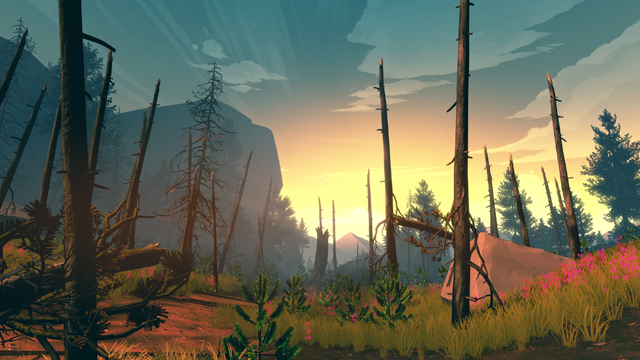
-
Firewatch #9
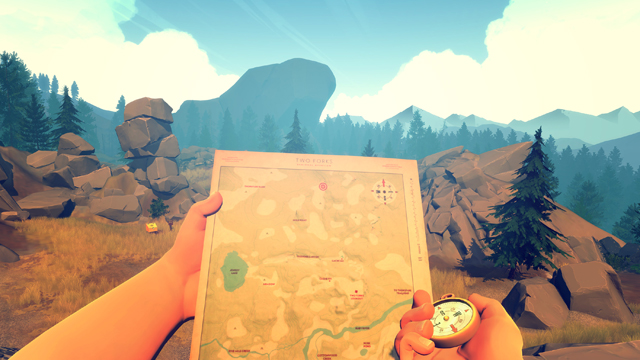
-
Firewatch #10
